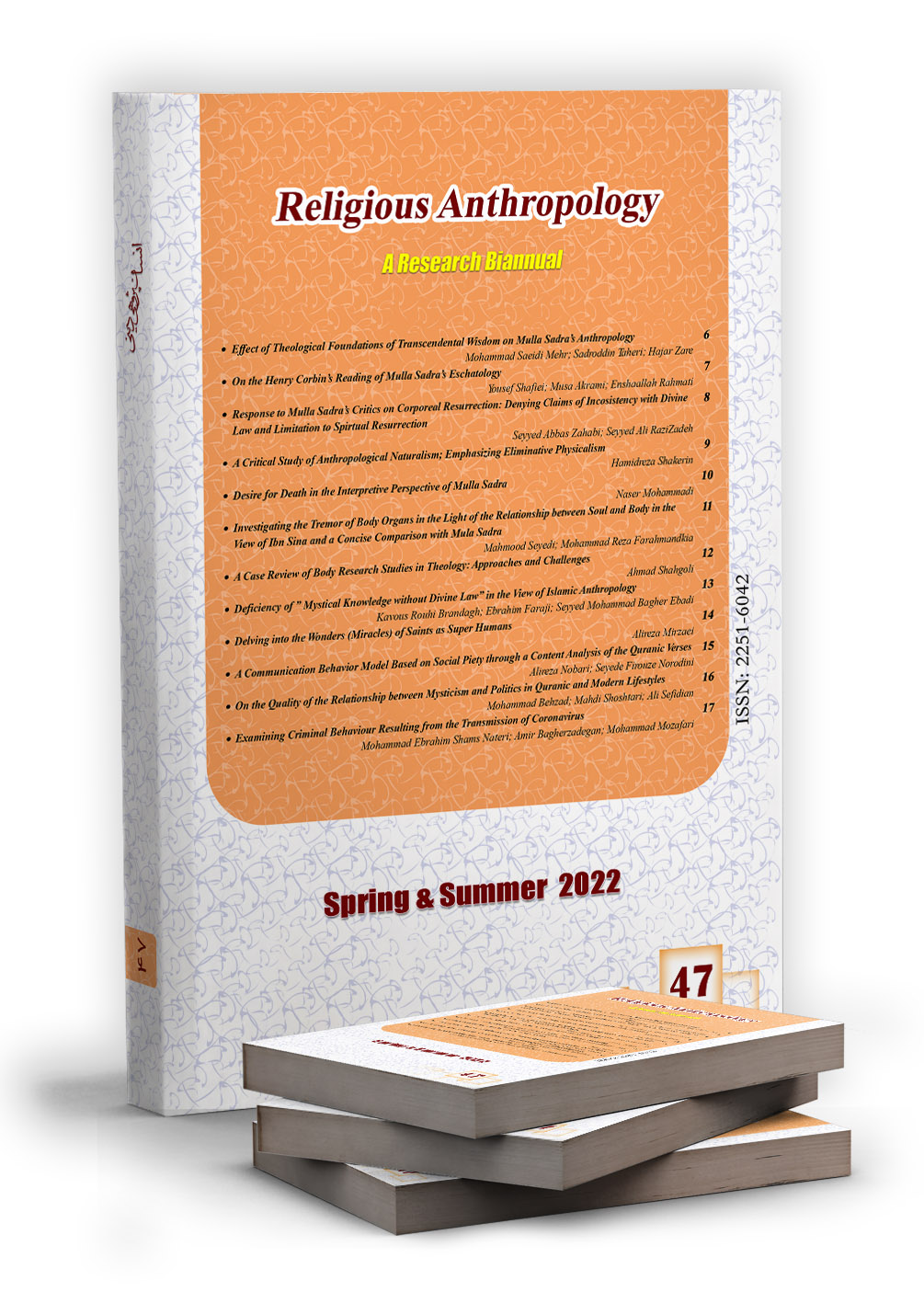Effect of Theological Foundations of Transcendental Wisdom on Mulla Sadra’s Anthropology
Document Type : Research Paper
Authors
1 Professor in Department of Philosophy and Islamic Theology, Islamic Azad University, Science and Technology Branch, Iran
2 Associate Professor in Department of Philosophy and Islamic Theology, Islamic Azad University, Science and Technology Branch, Iran
3 PhD Candidate of Philosophy and Islamic Theology, Islamic Azad University, Science and Technology Branch, Iran
Abstract
Keywords
- ابراهیمی دینانی، غلامحسین (1360)، قواعد کلی در فلسفه اسلامی، تهران: انجمن حکمت و فلسفه ایران.
- بهشتی، احمد (1383)، هستی و علل آن (شرح نمط چهارم الاشارات و التنبیهات)، قم: بوستان کتاب.
- جوادی آملی، عبدالله (1376)، رحیق مختوم (شرح حکمت متعالیه)، قم: مرکز نشر اسراء.
- الشیرازی، صدرالدین محمد (1380 الف)، الحکمة المتعالیة فی الاسفار الاربعة، تصحیح مقصود محمدی، تهران: بنیاد حکمت اسلامی صدرا.
- ــــــــــــ (1981 ق)، الحکمه المتعالیه فی اسفار الاربعه، بیروت: دار الاحیاء التراث العربی.
- ــــــــــــ (1380)، المبدأ و المعاد، تصحیح جلالالدین آشتیانی، قم: دفتر تبلیغات اسلامی.
- ــــــــــــ (1363)، المفاتیح الغیب، تصحیح محمد خواجوی، تهران: مؤسسه مطالعات و تحقیقات فرهنگی.
- ــــــــــــ (1382)، الشواهد الربوبیة فی المناهج السلوکیه، تصحیح مصطفی محقق داماد، تهران: انتشارات بنیاد حکمت اسلامی صدرا.
- ــــــــــــ (1364)، مظاهرالاهیه، ترجمه و تعلیق سید حمید طبیبیان، تهران: انتشارات امیرکبیر.
- ــــــــــــ (1363)، تفسیر سوره واقعه، ترجمه محمد خواجوی، تهران: انتشارات مولا.
- ــــــــــــ (1379)، تفسیر قرآن کریم، قم: انتشارات بیدار.
- ــــــــــــ (1352)، رسائل فلسفی، تعلیق و تصحیح سید جلالالدین آشتیانی، مشهد: انتشارات دانشکده الهیات و معارف اسلامی.
- طباطبایی، محمدحسین (1381)، بدایه الحکمه، ترجمه علی شیروانی، قم: انتشارات دارالعلم. ــــــــــــ (1386)، نهایة الحکمة، قم: دفتر تبلیغات اسلامی حوزه علمیه قم و بوستان کتاب.
- عبودیت، عبدالرسول (1386)، درآمدی به نظام حکمت صدرایی، قم: مؤسسه آموزشی و پژوهشی امام خمینی8 و تهران: سازمان مطالعه و تدوین کتب علومانسانی دانشگاهها (سمت).
- مطهری، مرتضی (1362)، خدا در زندگی انسان، تهران: حزب جمهوری اسلامی.
- ــــــــــــ (1377)، شرح منظومه، تهران: انتشارات صدرا.
